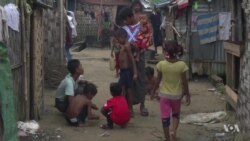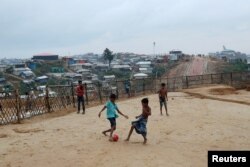ເມື່ອນຶ່ງປີກ່ອນ ໄດ້ມີການອົບພະຍົບຫຼົບໄພຂະໜາດໃຫຍ່ອອກຈາກ ລັດຣາໄຄນ໌ ຢູ່
ທາງພາກເໜືອ ຂອງປະເທດມຽນມາ. ພາຍໃນບໍ່ເທົ່າໃດເດືອນ ຊາວມຸສລິມໂຣຮິງຢາ
ຢູ່ໃນມຽນມາ ຈຳນວນ 700,000 ຄົນ ໄດ້ພາກັນຫລົບໜີເຂົ້າໄປໃນ ບັງກລາແດັສ ທີ່
ເປັນປະເທດເພື່ອນບ້ານ. ພວກເຂົາເຈົ້າ ໄດ້ເລົ່າເລື້ອງລາວຕ່າງໆໃຫ້ຟັງ ເຊັ່ນວ່າ
ການຖືກຂົ່ມຂືນ ການຄາດຕະກຳ ແລະ ການເຜົາໝູ່ບ້ານຫຼາຍແຫ່ງ ຈົນວອດວາຍ
ທັງໝົດນີ້ ແມ່ນຍ້ອນນ້ຳມື ຂອງກຳລັງຮັກສາຄວາມສະຫງົບຂອງມຽນມາ. ມາຣກາເຣັຕ
ເບີເຊຍຣ໌ ນັກຂ່າວວີໂອເອປະຈຳ ອົງການສະຫະປະຊາຊາດ ລາຍງານວ່າ ນຶ່ງປີ
ຜ່ານມາ ມັນກໍຍັງບໍ່ປອດໄພ ສຳລັບພວກເຂົາເຈົ້າ ທີ່ຈະກັບຄືນໄປຍັງບ້ານເກີດ ຂອງ
ພວກເຂົາເຈົ້າ ຊຶ່ງ ໄຊຈະເລີນສຸກ ຈະນຳເອົາລາຍລະອຽດ ມາສະເໜີທ່ານ ໃນອັນດັບ
ຕໍ່ໄປ.
ຢູ່ທີ່ສູນອົບພະຍົບໃນເມືອງຄັອກສ໌ ບາຊາຣ (Cox’s Bazar) ໃນບັງກລາແດັສ ພວກ
ຊາວໂຣຮິງຢາເຫຼົ່ານີ້ ດຳລົງຊີວິດ ຢູ່ໃນສູນອົບພະຍົບ ທີ່ໃຫຍ່ທີ່ສຸດຂອງໂລກ.
ພວກເຂົາເຈົ້າ ໄດ້ຮັບຄວາມເຈັບປວດທາງຮ່າງກາຍ ແລະ ຈິດໃຈ.
ພວກເຂົາເຈົ້າ ໄດ້ປະເຊີນກັບການລະເມີດຫຼາຍປະການ ທີ່ໂຫດຮ້າຍທາລຸນ ຮວມທັງ
ຄວາມອຶດຫິວ ພະຍາດໂຣຄາ ແລະລົມມໍລະສຸມ.
ທ່ານ ອາດາມາ ດຽງ ທີ່ປຶກສາພິເສດ ດ້ານການປ້ອງກັນບໍ່ໃຫ້ເກີດການຂ້າລ້າງຊົນ
ຊາດ ຂອງອົງການສະຫະປະຊາຊາດ ກ່າວວ່າ “ອັນນີ້ ເປັນສິ່ງທີ່ພວກເຮົາ ບໍ່
ສາມາດເອີ້ນວ່າ ແນວອື່ນ ແຕ່ເປັນການກວດລ້າງ ຊົນຊາດຊົນເຜົ່າ. ເຖິງ
ຢ່າງໃດກໍຕາມ ພາຍຫຼັງ ທີ່ຂ້າພະເຈົ້າ ໄດ້ໄປຢ້ຽມຢາມ ບັງກລາແດັສ ແທ້ຈິງ
ແລ້ວ ໃນເມືອງຄັອກສ໌ ບາຊາຣ ບ່ອນທີ່ຂ້າພະເຈົ້າ ໄດ້ພົບປະ ກັບພວກອົບ
ພະຍົບ ຂ້າພະເຈົ້າ ກໍສະຫລຸບໄດ້ວ່າ ກໍລະນີຂອງພວກເຂົາເຈົ້ານັ້ນ ຖ້າຫາກ
ເມື່ອໃດ ໄດ້ຖືກນຳຂຶ້ນສານ ເພື່ອຂໍຄວາມຍຸຕິທຳແລ້ວ ອາດຈະມີຄວາມຮ້າຍ
ແຮງ ເທົ່າກັບເປັນ ການກໍ່ອາຊະຍາກຳ ຂ້າລ້າງເຊື້ອຊາດເຜົ່າພັນ.”
ລັດຖະບານ ມຽນມາ ໄດ້ປະຕິເສດ ຕໍ່ການກ່າວຫາຕ່າງໆນາໆ ເຊັ່ນນັ້ນ.
ເອກອັກຄະລັດຖະທູດ ມຽນມາ ປະຈຳ ອົງການສະຫະປະຊາຊາດ ທ່ານ ຮົວ ໂດ ຊວນ
ເວົ້າວ່າ “ພວກເຮົາໄດ້ກ່າວ ກ່ອນໜ້ານີ້ ແລະ ອັນນີ້ ບໍ່ແມ່ນ ການກວດລ້າງ
ຊົນຊາດຊົນເຜົ່າ ອັນນີ້ບໍ່ແມ່ນການຂ້າລ້າງ ຊົນເຊື້ອຊາດເຜົ່າພັນ.”
ຊາວໂຣຮິງຢາ ເປັນຊົນກຸ່ມນ້ອຍ ຢູ່ໃນມຽນມາ ເຊິ່ງປະຊາຊົນສ່ວນໃຫຍ່ ນັບຖືສາ
ສະໜາພຸດ ແລະ ເປັນເວລາຫຼາຍທົດສະວັດແລ້ວນັ້ນ ພວກເຂົາ ໄດ້ຖືກປະຕິເສດ
ບໍ່ໄດ້ຮັບສັນຊາດ ພ້ອມກັບ ສິດທິຂັ້ນພື້ນຖານອື່ນໆ ນຳດ້ວຍ.
ການຫລັ່ງໄຫລອອກຈາກປະເທດ ຄັ້ງຫຼ້າສຸດ ແລະໃຫຍ່ສຸດ ໄດ້ເລີ້ມຂຶ້ນ ເມື່ອເດືອນ
ສິງຫາ ປີກາຍນີ້ ຫຼັງຈາກກອງທັບມຽນມາ ໄດ້ເລີ້ມທຳການປາບປາມຢ່າງໂຫດຮ້າຍ
ລຸນຫຼັງທີ່ໄດ້ມີການໂຈມຕີຮ້າຍແຮງຫຼາຍບັ້ນ ໂດຍພວກຫົວຮຸນແຮງ ໂຣຮິງຢາ ຕໍ່ກຳລັງ
ຮັກສາຄວາມສະຫງົບ.
ລັດຖະບານມຽນມາ ກ່າວວ່າ ສະຖານະການດັ່ງກ່າວ ໄດ້ດີຂຶ້ນ ແລະຕົນພ້ອມແລ້ວ
ທີ່ຈະຮັບເອົາພວກອົບພະຍົບກັບຄືນ.
ເອກອັກຄະລັດຖະທູດ ຮົວ ໂດ ຊວນ ກ່າວວ່າ “ດຽວນີ້ ສະຖານະການ ຢູ່ໃນສະ
ໜາມ ແມ່ນງຽບສະຫງົບ ແລະ ພວກເຮົາສາມາດ ຟື້ນຟູສັນຕິພາບ ແລະ
ສະຖຽນລະພາບ ຢູ່ໃນຂົງເຂດໄດ້ແລ້ວ.”
ແຕ່ໃນຂະນະທີ່ຄວາມຮຸນແຮງໄດ້ລົດລົງແດ່ແລ້ວ ບາງຄົນກໍຍັງມີຄວາມເປັນຫ່ວງຢູ່
ເພາະວ່າ ສາເຫດຕົ້ນຕໍຕ່າງໆນັ້ນ ແມ່ນຍັງບໍ່ໄດ້ຮັບການແກ້ໄຂເທື່ອ.
ທ່ານ ແມັຕຕິວ ວີລສ໌ ທີ່ປຶກສາອາວຸໂສດ້ານວິກິດການ ຂອງອົງການນິລະໂທດກຳ
ສາກົນ ກ່າວວ່າ “ອັນທີນຶ່ງ ບໍ່ມີການອອກມາຮັບຜິດຊອບ ກ່ຽວກັບອາຊະຍາກຳ
ຕ່າງໆ ທີ່ໄດ້ ກະທຳລົງໄປ ໂດຍພວກທະຫານຂອງມຽນມາ. ອັນທີສອງມາ
ລະບົບການຈຳແນກຊົນຊາດຊົນເຜົ່າ ແລະການປະຫັດປະຫານ ຕໍ່ຊາວ
ໂຣຮິງຢາ ນັ້ນ ແມ່ນຍັງມີຢູ່ຄືເກົ່າ ຢ່າງໜຽວແໜ້ນ.”
ສ່ວນທ່ານ ດຽງ ກ່າວວ່າ “ເງື່ອນໄຂ ສຳລັບການກັບຄືນບ້ານເກີດ ທີ່ປອດໄພ
ແລະມີກຽດ ແມ່ນຍັງບໍ່ທັນສົມບູນເທື່ອ ແລະອັນນັ້ນ ເປັນເຫດຜົນທີ່ຂ້າພະເຈົ້າ
ເຊື່ອວ່າ ມັນເຖິງເວລາແລ້ວ ທີ່ປະຊາຄົມນານາຊາດ ຈະກົດດັນ ລັດຖະບານ
ມຽນມາ ຫຼາຍຂຶ້ນ ເພື່ອເຮັດໃຫ້ພວກເຂົາເຈົ້າ ປະຕິບັດຕາມຄວາມໝັ້ນໝາຍ
ທີ່ພວກເຂົາ ໄດ້ໃຫ້ໄວ້ນັ້ນ ຢ່າງແທ້ຈິງ.”
ທ່ານນາງ ອອງ ຊານ ຊູຈີ ຜູ້ນຳທີ່ແທ້ຈິງ ຂອງປະເທດມຽນມາ ທີ່ໄດ້ຮັບລາງວັນໂນແບລ
ໄດ້ຖືກຕ້ອງຕິຈາກນານາຊາດ ໃນການທີ່ບໍ່ເຮັດຫຍັງເລີຍ ເພື່ອຍຸຕິວິກິດການດັ່ງກ່າວນັ້ນ.
ແຕ່ຢູ່ພາຍໃນປະເທດແລ້ວ ທ່ານນາງ ບໍ່ໄດ້ປະເຊີນກັບຄວາມກົດດັນ ໃຫ້ຊ່ອຍເຫຼືອ
ຊາວໂຣຮິງຢາ.
ທ່ານນາງ ເດບຣາ ໄອເຊັນແມນ ຜູ້ອຳນວຍການຄຸ້ມຄອງ ຢູ່ສະຖາບັນນະໂຍບາຍ
ປະຊາຄົມເອເຊຍ ກ່າວວ່າ “ຖ້າເຈົ້າວັດແທກອຸນຫະພຸມຢູ່ສະໜາມໃນມຽນມາ
ແລ້ວ ພົນລະເມືອງທົ່ວໄປ ບໍ່ຫົວຊານຳພວກຊາວໂຣຮິງຢາເລີຍ. ຄວາມຈິງ
ແລ້ວ ຫຼາຍໆຄົນ ແຮງດີໃຈ.”
ບັນດາຜູ້ສັງເກດການ ນານາຊາດ ຫຼາຍໆຄົນ ກ່າວວ່າ ຄວາມຮັບຜິດຊອບ ເປັນສິ່ງ
ສຳຄັນຍິ່ງ ສຳລັບການາແກ້ໄຂບັນຫາທີ່ຍືນຍົງ.
ທ່ານ ວີລສ໌ ກ່າວວ່າ “ພວກເຮົາ ຢາກເຫັນ ການນຳສະເໜີ ຕໍ່ສານອາຍາສາກົນ
ໂດຍສະພາຄວາມໝັ້ນຄົງ ອົງການສະຫະປະຊາຊາດ. ການກໍ່ອາຊະຍາກຳ
ທີ່ໄດ້ກະທຳໄປ ຢູ່ໃນລັດຣາໄຄນ໌ ທາງພາກເໜືອ ຂອງມຽນມາ ແມ່ນຖືວ່າ
ເປັນອາຊະຍາກຳ ພາຍໃຕ້ກົດໝາຍສາກົນ. ກໍຄືອາຊະຍາກຳຕ້ານມະນຸດ
ຊາດ.”
ມຽນມາ ໄດ້ຈັດຕັ້ງ ຄະນະກຳມາທິການສອບສວນ ຂອງຕົນເອງຂຶ້ນມາ ທີ່ປະກອບ
ດ້ວຍນັກຊ່ຽວຊານສາກົນສອງທ່ານ ແລະນັກຊ່ຽວຊານພາຍໃນປະເທດ ສອງທ່ານ
ແຕ່ບັນດານັກສັງເກດການ ແມ່ນມີຄວາມສົງໄສວ່າ ມັນຈະສາມາດດຳເນີນການ
ຕາມການມອບໝາຍໄດ້ຫຼືບໍ່.
ມຽນມາ ແລະບັງກລາແດັສ ໄດ້ລົງນາມໃນຂໍ້ຕົກລົງ ສະບັບນຶ່ງ ວ່າດ້ວຍການກັບຄືນ
ສູ່ບ້ານເກີດ ຂອງພວກອົບພະຍົບ ແຕ່ມາເຖິງເວລານີ້ ຍັງບໍ່ມີຜູ້ໃດກັບຄືນໄປເລີຍ.
ໃນຫົກເດືອນທຳອິດຂອງປີນີ້ ຊາວໂຣຮິງຢາ ຫຼາຍກວ່າ 11,000 ຄົນ ໄດ້ເດີນທາງໄປ
ຮອດ ບັງກລາແດັສ.
ທ່ານ ດຽງ ກ່າວວ່າ “ນຶ່ງປີ ຕໍ່ໜ້າ ພາບພົດ ກໍຍັງຄົງມືດມົວຢູ່.”
ລັດຖະບານມຽນມາ ກ່າວວ່າ ຕົນກຳລັງເຮັດວຽກ ເພື່ອຈັດຕັ້ງປະຕິບັດຂໍ້ແນະນຳຕ່າງໆ
ຂອງຄະນະທີີ່ປຶກສາ ນຳພາໂດຍ ມື້ລາງທ່ານ ໂຄຟີ ອານນັນ ລວມທັງເລື້ອງບັນຫາ
ການໃຫ້ສັນຊາດ ນຳດ້ວຍ.
ເອກອັກຄະລັດຖະທູດ ຊວນ ກ່າວວ່າ “ຂໍ້ແນະນຳໄລຍະຍາວຕ່າງໆ ກໍຄື ການ
ສ້າງຄວາມເຊື່ອໝັ້ນ ແລະ ຄວາມປອງດອງ ຄວາມສະຫງົບສຸກ ຢູ່ໃນຂົງເຂດ
ແລະພ້ອມກັບການສ້າງ ໃນພາກສ່ວນການພັດທະນາເສດຖະກິດ ແລະສັງຄົມ.
ສິ່ງທັງຫຼາຍເຫຼົ່ານີ້ ຈະຕ້ອງໃຊ້ເວລາ.”
ທ່ານນາງ ອອງ ຊານ ຊູ ຈີ ເມື່ອບໍ່ດົນມານີ້ ໄດ້ເຕືອນວ່າ ການກໍ່ການຮ້າຍ ຍັງຄົງເປັນ
ໄພຂົ່ມຂູ່ ຢູ່ໃນລັດຣາໄຄນ໌ ແລະເອກອັກຄະລັດຖະທູດມຽນມາ ໄດ້ກ່າວຕໍ່ ວີໂອເອ ວ່າ
ລັດຖະບານຂອງທ່ານ ເຊື່ອວ່າ ອາດຈະມີການໂຈມຕີຫຼາຍບັ້ນຕື່ມອີກ ໂດຍພວກຫົວ
ຮຸນແຮງ ໂຣຮິງຢາ.
ອ່ານຂ່າວນີ້ຕື່ມ ເປັນພາສາອັງກິດ
One year ago, a great exodus began from Myanmar's northern Rakhine State. Within a few months, 700,000 Rohingya Muslims had fled into neighboring Bangladesh. They gave accounts of rape, murder and villages burned to the ground, all at the hands of Myanmar's security forces. VOA U.N. Correspondent Margaret Besheer reports that one year later, it is still not safe for them to return home.
These Rohingya are living in the world's largest refugee camp.
They are traumatized.
They have faced horrific abuses, hunger, disease and a monsoon.
Adama Dieng, UN Special Advisor on the Prevention of Genocide said
"This is something we cannot but call ethnic cleansing. However, following my visit in Bangladesh, precisely in Cox's Bazaar, where I met with the refugees, I reached the conclusion that their case, if ever brought before a court of justice, may amount to the crime of genocide."
The government has denied such accusations.
Ambassador of Myanmar to the UN Hau Do Suan, said
"We have said before, and this is not ethnic cleansing, this is not genocide."
The Rohingya are a minority in mainly Buddhist Myanmar and for decades have been denied citizenship, as well as other basic rights.
The latest and largest exodus began last August after the military started a brutal crackdown, following deadly attacks by Rohingya militants on the security forces.
The government says the situation has improved and it is ready to receive refugees.
Ambassador of Myanmar to the UN Hau Do Suan, said
"Now, the situation on the ground is quiet, and we have been able to restore peace and stability in the region."
But while the violence has subsided, some are concerned the root causes remain unaddressed.
Mathew Wells, Senior Crisis Advisor, Amnasty International said
"First there has been no accountability for the crimes that were committed by the Myanmar military. Second, the entire system of discrimination and persecution against the Rohingya remains firmly in place."
Adama Dieng, UN Special Advisor on the Prevention of Genocide said
"The conditions for a safe and dignified return are not yet met and that is why I do believe that it is time for the international community to make more pressure on the government of Myanmar so that they really fulfill the commitment they have made."
The country's de facto leader, Nobel laureate Aung San Suu Kyi, has come in for international criticism for not doing more to end the crisis.
But domestically, she faces no pressure to help the Rohingya.
Debra Eisenman, Managing Director, Asia Society Policy Institute said
"If you take the temperature on the ground in Myanmar, the average citizen doesn't care about the Rohingya. In fact, many are pleased."
Many international observers say accountability is critical to a lasting solution.
Mathew Wells, Senior Crisis Advisor, Amnasty International said
"We need to see a referral to the International Criminal Court by the U.N. Security Council. The crimes that were committed in northern Rakhine state are crimes under international law. Crimes against humanity."
Myanmar has established its own Commission of Inquiry with two international experts and two domestic ones, but observers are skeptical it can carry out its mandate.
Myanmar and Bangladesh have signed an agreement on the return of the refugees, but so far none have come back. In the first six months of this year, more than 11,000 Rohingya arrived in Bangladesh.
Adama Dieng UN Special Adviser on the Prevention of Genocide said
"One year down the road the picture is still very grim."
The government says it's working to implement recommendations of an advisory board led by the late Kofi Annan, including on the citizenship issue.
Ambassador of Myanmar to the UN Hau Do Suan said
"Long-term recommendations like building trust and harmony, peace in the region, and also building the social-economic development of the area. They will take time."
Aung San Suu Kyi recently warned that terrorism remains a threat in Rakhine state and the Myanmar ambassador told VOA that his government believes there could be another wave of attacks by Rohingya militants.












